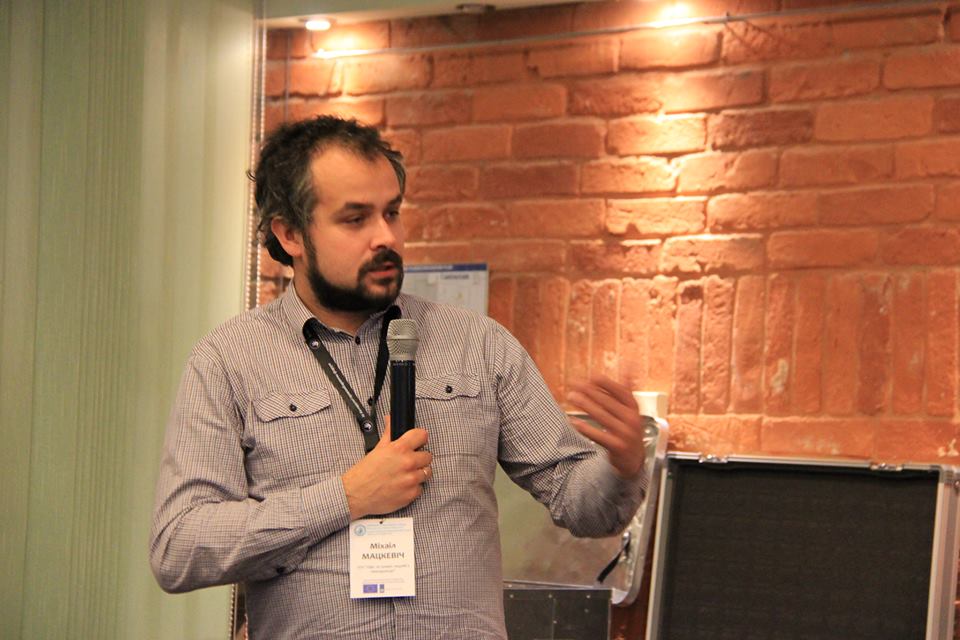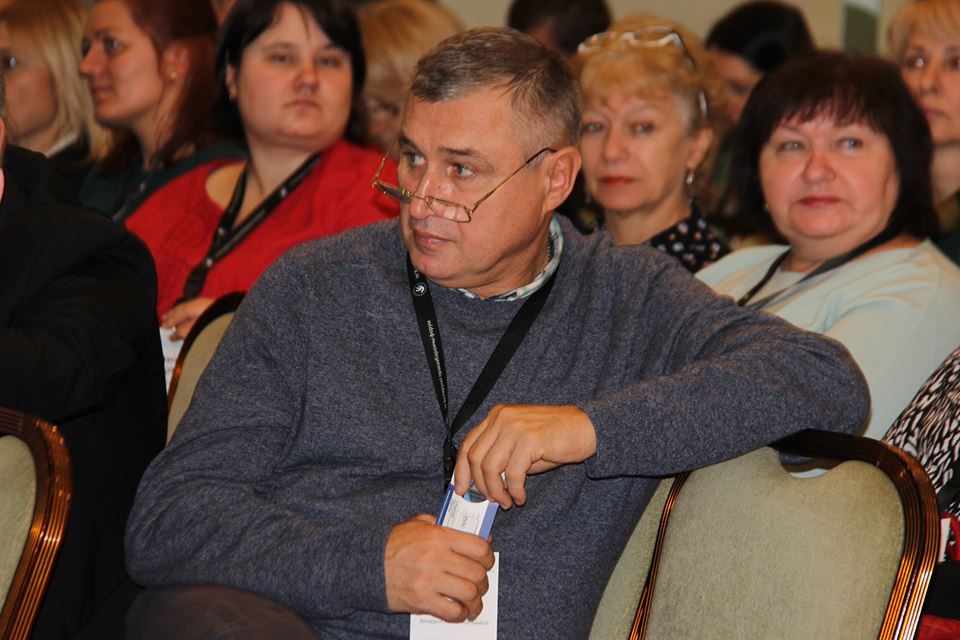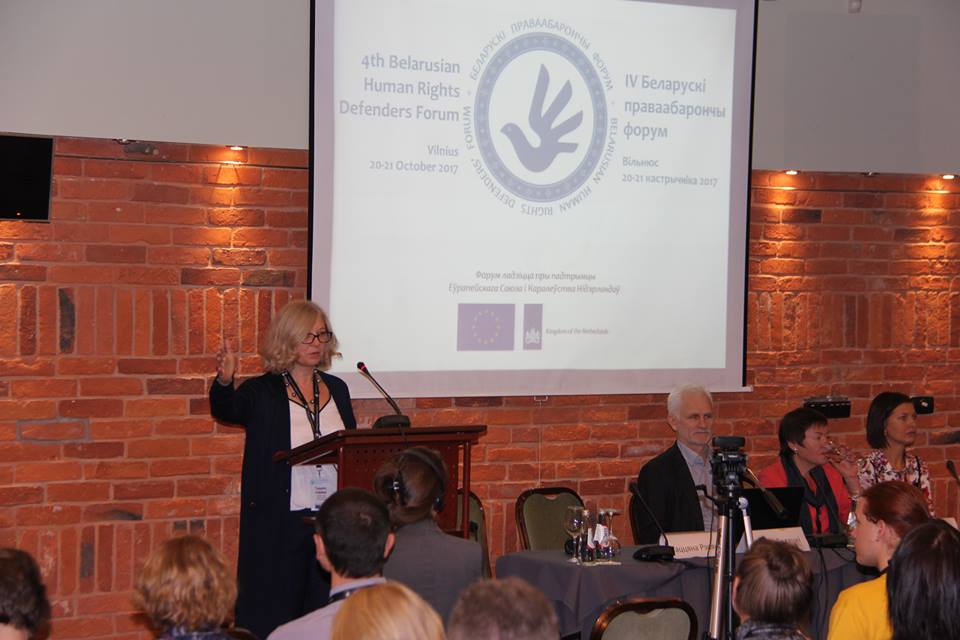“The forum has become a good tradition – beginning in 2004 and continuing in 2010 and 2013. Many of today’s participants and guests took part in the previous forums, and the number of participants is increasing every year. In 2010, the forum received 17 organisations; in 2013, 25 organisations; and now, there are representatives of 29 organisations. The human rights sector is expanding: there are new people and organisations, new areas of activity. That progress and development can only be welcomed,” said Tatsiana Revyaka, the president of the Barys Zvozskau Belarusian Human Rights House, during her speech welcoming participants.

One of the participants of the forum, Mikhail Matskievich (photo above) representing the Office for the Rights of Persons with Disabilities, said that the forum provides an opportunity to get acquainted with colleagues and to understand one’s place in the overall situation better:
“The forum is an opportunity for a reflective attitude towards the human rights movement. It allows us to state some changes taking place in the sector. Also, this is definitely an opportunity to see new faces. Despite the fact that we work in a common field, it is always possible to get acquainted with someone who we did not know before. Also, the forum gives motivation; this is also an important point. It is important to feel yourself as a part of a community, part of something bigger. Of course, it is difficult to discuss all the issues in detail within the framework of one-and-a-half-hour sessions, but it helps to understand the views and moods of the colleagues. For example, during the previous forums we only talked about ethical principles, but at the current one they have already been adopted. Thus, one can say that there is a certain planned movement. The forum is one of the opportunities to discuss the nearest plans, so that the colleagues also have an understanding of where we move all together and each one separately.”

The need for working together, consolidated and united, was emphasised by Ales Bialiatski (photo above), head of the Viasna human rights center: “My message is following: friends, we have to continue working together. Our joint actions are much more effective than when we work alone. Therefore, let us carry out solidarity campaigns, let us implement joint projects, connecting our friends and partners from Ukraine, from Russia, from the EU. It should enhance the effect of the human rights forces through the joint efforts. We need to continue working. The field is big, there are few sowers; and who, if not us?”
During the forum, the issue of working conditions for human rights defenders in Belarus and, in particular, a wave of mass detentions and arrests in the spring of 2017 were discussed repeatedly.

Leanid Svetsik (photo above), a representative of Viasna in Viciebsk, told an audience at the forum about how he was supported by the colleagues during his 15 days’ administrative arrest: “First of all, the forum provides an opportunity to feel each other’s support; to realise that we need each other in order to confront all the challenges that arise in our activities. This gives an opportunity to become more united, gives confidence that at a critical moment you will receive help from your comrades. When I was sentenced for 15 days of administrative arrest for participating in mass events in Viciebsk, I received dozens of letters of support from my colleagues.”

Leanid’s words were supported also by his colleague from the Belarusian Helsinki Committee in Viciebsk, Paval Levinau (photo above): “The spring, which we had this year… It can be said with certainty, that if there were no previous forums, then there would be no such unity. There was a feeling that one is for all and all for one. We felt support not only inside Belarus, but also from the foreign human rights movements, because every forum is visited by our colleagues, human rights activists from neighbouring countries.”
During the forum, representatives presented and discussed research evaluating the human rights situation in Belarus and the human rights community. This included a report on the public perception in Belarus of human rights and advocacy by Freedom House, and a report on Belarusian human rights defenders’ views on human rights activity – initiated by The Barys Zvozskau Belarusian Human Rights House with the expert support of the Legal Transformation Center (Lawtrend) and the Assembly of Pro-Democratic NGOs of Belarus.
Other issues discussed at the forum included the code of ethics of the Belarusian human rights defenders, as well as the procedure and criteria for the definition of “political prisoner”.
In 2013 during the third Belarusian human rights forum, the Guidelines aimed to define “political prisoner” were presented. During the current human rights forum, human rights defenders Uladzimir Javorski and Valiantsin Stefanovich shared their experience of using the developed criteria for determining which prisoners are political prisoners.
Guidance on the definition of “political prisoner” was developed by a working group of human rights defenders from Azerbaijan, Belarus, Georgia, Lithuania, Poland, Russia and Ukraine and accepted in October 2013. Its purpose is to unify various approaches of human rights organisations on the definition and use of the term “political prisoner.” Since the adoption of the Guidelines, six persons received such status in Belarus. At this time two of them are still in prison: Mikhail Zhamchuzhny and Dzmitry Palienka.
The demand for the release of political prisoners has been, among other things, referred to in Resolution of the fourth Belarusian human rights forum. The resolution was adopted unanimously on 21 October.
Documents:
-
- Resolution of the 4th Belarusian Human Rights Forum
In the resolution, unanimously adopted on 21 October, the participants of the forum highlighted existing issues in the human rights situation in Belarus, and provided recommendations for the Belarusian authorities.
- Resolution of the 4th Belarusian Human Rights Forum
About the Forum
The forum has existed for 13 years as a unique platform where the entire civil society of the country is able to gather to work together on and discuss the human rights situation, as well as to meet colleagues old and new.
The 2017 forum is the third to have been held in exile in the Lithuanian capital city. Previous forums have been held in 2013 and 2010, both in Vilnius, and in 2004 in Minsk. Smaller meetings of Belarusian civil society are held on an annual basis.
Ten years as a home for Human Rights
In 2017, Belarusian human rights defenders celebrated the 10-year anniversary of the Belarusian Human Rights House, established in exile in Vilnius, Lithuania.
The House has for 10 years brought sanctuary to Belarusian human rights defenders, creating space and certainty for them to build human rights capacity and develop strategies long term, in spite of the restrictions and threats of working on human rights in an authoritarian country. It is an essential link for Belarusian human rights defenders to the outside world.
Read more about the Belarusian Human Rights House: from its establishment to its many successes.
More on Belarus
UN responds to Belarus crackdown; renews mandate





